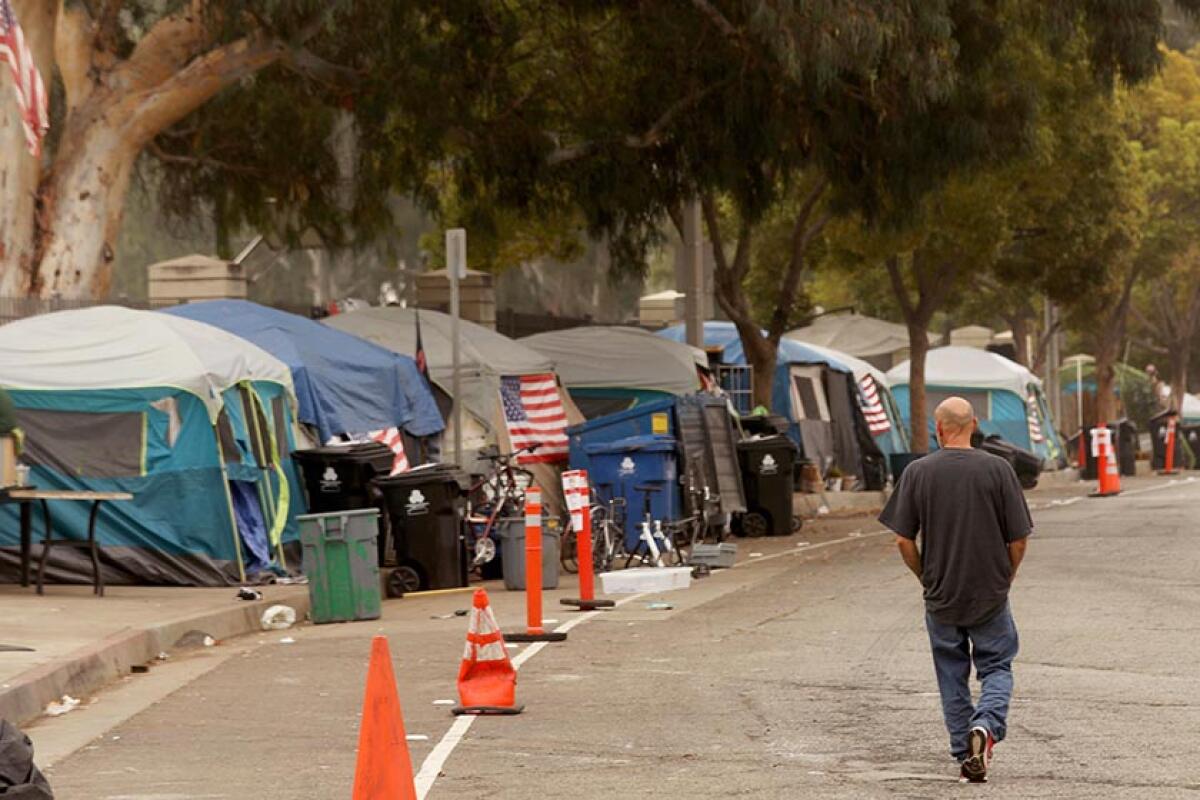Voters support Newsom’s mental health plan and back mandatory kindergarten, poll shows

- Share via
SACRAMENTO — California voters strongly support Gov. Gavin Newsom’s plan to set up a new court system for people struggling with a combination of severe mental illness, homelessness and substance use, but split with the governor on requiring children to attend kindergarten, a new poll shows.
Newsom introduced his sweeping Community Assistance, Recovery and Empowerment (CARE) Court proposal earlier this year amid increasing concern over the number of people living in crisis on California’s streets. Legislation to codify CARE Court, Senate Bill 1338, easily passed the Legislature with bipartisan support, and Newsom signed the measure into law last month.
Civil and disability rights groups spent the majority of the legislative session in fervent opposition to CARE Court over concerns the new law could criminalize homelessness and lead to mentally ill people being coerced into treatment.
Despite those fears, voters expressed overwhelming support for the new law, according to a new UC Berkeley Institute of Governmental Studies poll co-sponsored by the Los Angeles Times. The poll asked voters if they supported the plan that would “provide court-ordered treatment for Californians struggling with severe mental illness including those who are homeless” and noted that “the CARE Court would have the authority to order mental health treatment for people with severe mental illnesses even if they did not seek it.”
Seventy-six percent of registered voters said they favored CARE Court, including 41% who said they strongly supported the idea. Fifteen percent said they were opposed to the plan, while 9% reported no opinion.
Support was consistent across political parties, with 80% of registered Democrats, 69% of Republicans and 74% who identify as no party preference saying they favored the new law. The broad acceptance for CARE Court remained steady across race, income, age and gender.
“There is strong bipartisan support for CARE Court,”
said Berkeley IGS poll director Mark DiCamillo. “People want anything done to get these mentally ill people off the street. I mean, it’s overwhelming.”
Proponents have called the new law a paradigm shift that aims to treat people who’ve cycled in and out of jails and hospitals and who are headed toward a more restrictive court-ordered conservatorship.
An estimated 7,000 to 12,000 people statewide are expected to qualify for CARE Court, a population that is limited to those at greatest risk of death or serious harm due to their conditions.
Not everyone would have to be homeless to qualify for a CARE plan, but the new court system was crafted to focus on those who suffer from substance use disorder and have been diagnosed with serious mental illness such as schizophrenia.
To initiate a CARE plan, family members, first responders, medical professionals and behavioral health providers could petition a judge to order an evaluation of an individual adult. If it’s determined the person would benefit from medication and behavioral health treatment, the court could order a CARE plan that, for up to two years, would include those services and housing appropriate for their needs.
California voters split with Newsom on another popular program passed by the Legislature this year that would have made kindergarten mandatory for all children in California. Newsom vetoed the bill, citing the estimated $268-million annual cost, despite his strong advocacy for early education programs during his time as governor.
The poll found that 57% of likely voters favored making kindergarten a requirement while 33% opposed it. Support was divided along partisan lines, however, with 70% of Democrats backing the proposed law and 58% of Republican opposing it. No party preference voters supported mandatory kindergarten by a 56% to 33% margin.
“The Democrats and the liberals were strongly behind that idea,” DiCamillo said. “It’s kind of counterintuitive for Newsom to have vetoed it. I don’t really get it because he’s been in favor of early childhood education.”
Senate Bill 70, written by state Sen. Susan Rubio (D-Baldwin Park), would have required children to complete a year of kindergarten before entering first grade, beginning in the 2024-25 school year.
Dozens of school districts and education groups supported the bill, pointing to academic setbacks experienced during the COVID-19 pandemic as parents opted out of kindergarten to avoid distance learning woes.
Like most states, California does not mandate kindergarten as it does other grades. California children who are 5 years old are eligible for kindergarten but are not required by law to attend school until they are 6.
The Berkeley IGS poll was conducted online Sept. 22-27 among 8,725 California registered voters. The sample was weighted to match census and voter registration benchmarks. Because of weighting, precise estimates of the margin of error are difficult, but the results are estimated to have a margin of error of approximately 2 percentage points in either direction for the full sample.
More to Read
Sign up for Essential California
The most important California stories and recommendations in your inbox every morning.
You may occasionally receive promotional content from the Los Angeles Times.












